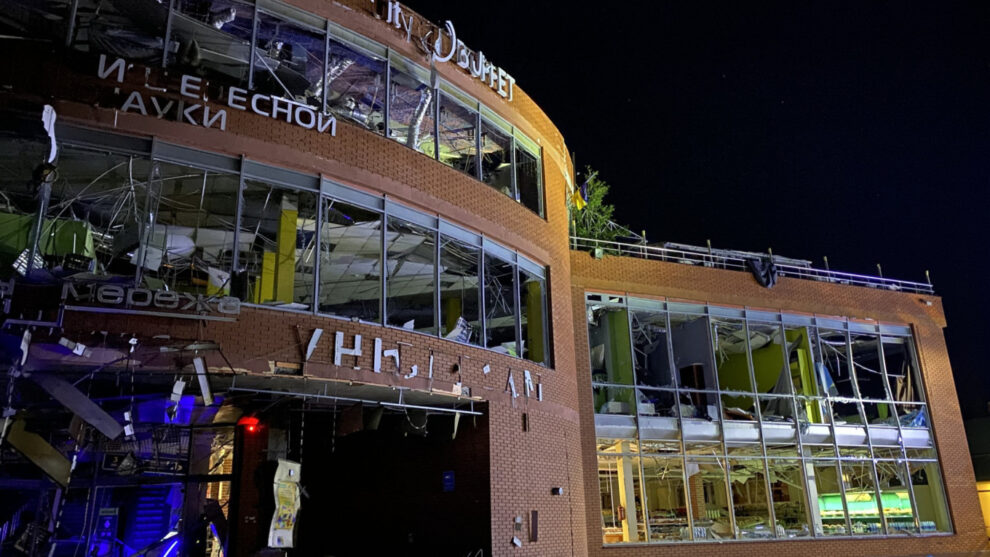Deadly Russian missile strikes hit southern and eastern Ukraine on Wednesday as the Western-backed country’s air defenses fought back against Moscow’s intensified attacks.
Russia fired four Kalibr missiles on the southern port city of Odesa from a warship in the Black Sea, Ukraine’s air force said, with air defenses shooting down three of them.
One of the missiles hit a food warehouse, killing three employees and wounding seven, Oleg Kiper, the head of the region’s military administration, said on Telegram.
“There may be people under the rubble,” he added.
Six other people were wounded after a business center, shops and a residential complex in central Odesa were damaged “as a result of air combat and the blast wave,” he said.
A historic city on the Black Sea, Odesa was once a favorite holiday destination for many Ukrainians and Russians.
It has been repeatedly bombed since Russia invaded in February last year.
In January, the United Nations cultural agency UNESCO designated the city’s historic center as a World Heritage in Danger site.
In the eastern cities of Kramatorsk and Kostiantynivka, Russian missile strikes overnight killed three people and destroyed dozens of private houses, regional authorities said.
Kyiv also reported that Russian shelling of a van in northeastern Ukraine, near the border with Russia, had left six people dead a day earlier.
Ukrainian prosecutors said the Soviet-era van was hit near the village of Seredyna-Buda, on the border with Russia in the northeastern region of Sumy. Four of the victims were foresters, they said.
Moscow has intensified its nightly attacks on major Ukrainian cities in recent weeks while Kyiv has launched a long-awaited counteroffensive to reclaim territory occupied by Russian forces.
Ukraine said Wednesday that in the last three days Kyiv has retaken around three square kilometers (about one square mile) of territory and advanced in some areas as deep as 1.4 kilometers while fighting continued near recaptured villages.
The latest strikes came as the death toll from Tuesday’s missile strikes on Kryvyi Rih — the hometown of President Volodymyr Zelensky — rose to 12.
Authorities in the central Dnipropetrovsk region, which includes Kryvyi Rih, also reported a fresh Russian drone attack overnight.
“All three ‘Shaheds’ were shot down in the sky over the region,” regional Governor Serhiy Lysak said on Telegram, referring to the Iranian attack drones used by Russia.
While Kyiv says it was making gains after launching its counteroffensive, Putin on Tuesday claimed his forces were inflicting “catastrophic” losses on Ukrainian troops.
IAEA chief to visit plant
Putin conceded during a Kremlin meeting with war bloggers that Russian forces were suffering from diminishing stockpiles of some military equipment, pointing in particular to attack drones and missiles.
Kyiv quickly fired back, insisting that Ukraine’s push, bolstered with Western weapons and training, had “certain gains, implementing our plans, moving forward.”
According to military analysts, Ukraine has not yet committed the bulk of its forces in its counteroffensive, and is currently still testing the front with probing attacks to determine weak points.
In recent days, Kyiv has claimed to have re-captured several villages in the eastern and southern regions.
“Ukrainian forces continued counteroffensive operations in at least three directions and made further limited territorial gains on June 13,” the Washington-based Institute for the Study of War said.
UN nuclear chief Rafael Grossi was expected at the Moscow-occupied Zaporizhzhia atomic power plant on Wednesday, but Russian news agencies reported the visit had been delayed by a day.
“The mission is being postponed by a day,” state news agency TASS quoted a nuclear official as saying, without giving a reason.
Moscow-installed officials in Zaporizhzhia also said Grossi would now visit the plant on Thursday. Kyiv and the International Atomic Energy Agency (IAEA) did not confirm the delay.
The safety of Europe’s largest nuclear power plant, located in Ukraine’s southeastern region of Zaporizhzhia, has been a concern since Russian forces seized it over a year ago.
Those concerns have been exacerbated by the breach of the Kakhovka dam that provided the cooling water for the plant.
While in Kyiv on Tuesday, Grossi said there was “no immediate situation” but the water level in the cooling pond was of concern.
“I want to make my own assessment. I want to go there, discuss with the management there what measures they are taking, and then make as I said a more definitive assessment of what kind of danger we have,” Grossi said after meeting with Zelensky.
The IAEA has warned that the dam disaster, which has left dozens dead and missing, further complicated “an already precarious nuclear safety and security situation” at the plant.
Kyiv has accused Moscow of blowing up the dam on the Dnipro River, while Russia has blamed Ukraine.
Source : TheMoscowTimes









